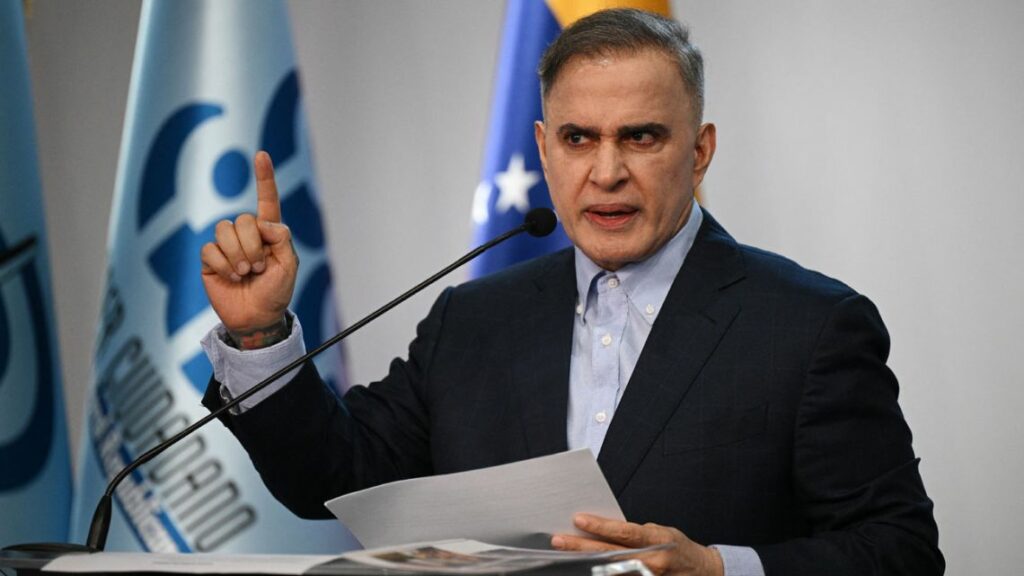Bilateral relations between Argentina and Venezuela plunged to a new low this week as the government in Caracas announced it would seek an arrest warrant against President Javier Milei, his sister and the nation’s security minister.
Venezuela’s Attorney General Tarek William Saab said Wednesday that he would ask the domestic courts to issue a warrant for Milei’s arrest as part of a longstanding row over the 2022 confiscation of a cargo plane in Buenos Aires.
After a 20-month court battle and probe of the aircraft’s Venezuelan-Iranian crew, the plane was handed over to the United States last February, two months after Milei took office.
The statement comes a day after an NGO and two federal prosecutors in Argentina asked its domestic justice system to order the arrest of Maduro, several of his top officials, spies and soldiers as part of a case alleging serious crimes against humanity.
Venezuela’s government is under severe international pressure after a disputed July 28 election that electoral authorities said Maduro won, returning him for a six-year term.
Speaking at a press conference Wednesday, Saab said that Venezuela’s Public Prosecutor’s Office had assigned two special prosecutors to process an arrest warrant for Milei, presidential chief-of-staff Karina Milei and Security Minister Patricia Bullrich.
Saab said the allegations include ‘aggravated robbery, money-laundering, unlawful deprivation of liberty, simulation of a punishable act, unlawful interference, disabling an aircraft and association to commit a crime.”
Saab also announced an investigation into crimes against humanity in the policing of protests in Argentina against Milei’s government, which he described as “genocide.”
“We have decided to appoint a specialised human rights prosecutor to carry out the corresponding investigations” against Milei and Bullrich, said the Venezuelan prosecutor. “They will have to answer to justice. A state can exercise universal jurisdiction.”
The Foreign Ministry in Buenos Aires “repudiated” the allegations in a statement.
“The aforementioned case was resolved by the Judiciary, an independent power over which the Executive cannot and should not interfere in any way, in application of an international agreement,” it read.
The government “reminds the Venezuelan regime that in the Argentine Republic the division of powers and the independence of judges prevails, something that unfortunately does not occur in Venezuela under the regime of Nicolás Maduro,” it concluded.
The aircraft at the heart of the row was grounded at Ezeiza International Airport in June 2022 by authorities in Argentina, acting upon a request from the US courts.
The Boeing 747-300 cargo plane was sold to Emtrasur, a subsidiary of Venezuelan state airline Conviasa, by Iran’s Mahan Air – a transaction which the United States government said contravened its sanctions against both countries.
According to the US authorities, the sale of the aircraft violated export laws and also benefited the Islamic Revolutionary Guard Corps, a group under sanctions.
After a 20-month legal battle, a judge authorised the seizure of the plane by the United States. The aircraft was handed over in February amid allegations of ‘theft’ from Caracas.
As part of the investigation, the plane’s 19-strong crew was briefly detained. Composed of Venezuelans and Iranians, the US government initially alleged that at least one individual had links to the Al Quds Force, a group of the Iranian Revolutionary Guards.
All 19 were later freed by the courts after the courts in Argentina determined they had committed no crime.
The bilateral judicial clash is the latest chapter in a series of flashpoints between Maduro and Milei since the Argentine leader took office.
The two nations currently have no diplomatic relations and Argentina’s Embassy in Caracas had to vacate after the recent July 28 elections, in which Maduro claimed a disputed victory.
Venezuela’s opposition, with backing from much of the international community, says it can prove Maduro stole the vote.
Protests erupted after the socialist leader was announced the winner of a third six-year term. They claimed the lives of 25 civilians and two soldiers, left nearly 200 people injured and more than 2,400 arrested.
Argentina is one of many countries that do not recognise Maduro as Venezuela’s legitimate leader.
Venezuela’s government faces an ongoing investigation from the International Criminal Court (ICC) for alleged crimes against humanity related to the repression of 2017 opposition protests that left more than 100 dead.
Maduro’s government rejects the allegations. Earlier this month, Argentina submitted a request to the ICC seeking the arrest of Maduro and several of his top officials.
On Tuesday, two federal prosecutors and an NGO backed by several Argentine lawmakers asked a federal court in Buenos Aires to issue a warrant for the arrest of Maduro and his right-hand man, Diosdado Cabello, as well as a number of top spies and military officers.
The complaint denounces alleged cases of torture, kidnappings and executions in Venezuela.
– TIMES/AFP/NA
Source link : http://www.bing.com/news/apiclick.aspx?ref=FexRss&aid=&tid=66ecce09a606423e83dddfe6c593b5f8&url=https%3A%2F%2Fwww.batimes.com.ar%2Fnews%2Flatin-america%2Fvenezuela-seeks-arrest-of-president-milei-as-bilateral-ties-hit-new-low.phtml&c=17312540883432218536&mkt=en-us
Author :
Publish date : 2024-09-19 04:44:00
Copyright for syndicated content belongs to the linked Source.
